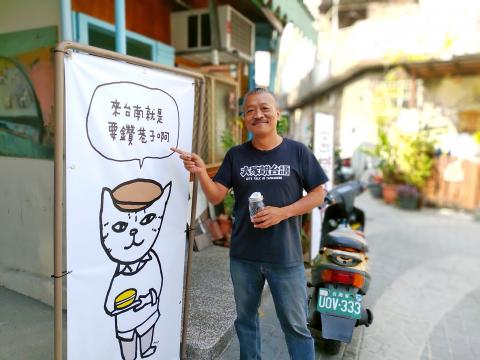Fourteen stores on Tainan’s Jhengsing Street (正興街) on Thursday began using Hoklo (commonly known as Taiwanese) when helping tourists, part of a larger movement to promote the fluent use of Hoklo.
The movement, called “Discover Hoklo in Tainan,” was spearheaded by Hoklo pop singer Hsieh Ming-yu (謝銘祐), the Tainan Community College, the Flomo Education Foundation, Saikaokin Hostel and the shops on the street.
Hsieh, who teaches popular culture and music at the community college, said that he has come to realize that while many younger students say that Hoklo is their native tongue, they unconsciously use Mandarin syntax and grammar when speaking it.

Photo: Tsai Wen-chu, Taipei Times
“The environment for speaking Hoklo is rapidly disappearing,” Hsieh said, adding that he hopes the movement will help more people learn to speak Hoklo like a native speaker.
Mastering a language is about using it correctly, which is heard more often on the streets than in school, Hsieh said.
The phrase tsi tshui ta (止喙焦), meaning “to quench one’s thirst,” is often used in tea stores, while the phrase for traditional stores that sell suits is a homonym of Saville Row in England, Hsieh said.
Learning the language while it is being used would serve to promote it better than learning it at school, Hsieh said, adding that it would also help tourists understand the unique characteristics of Tainan’s long-standing stores.
Community college staffer Lin Kuan-chou (林冠州) said the movement has received the support of many stores, with the 14 stores on Jhengsing Street — a spot largely frequented by young people — being the first to implement Hoklo services.
The ultimate goal is to make Jhengsing Street entirely Hoklo-speaking, Lin said.
Store owner Erik Kao (高耀威) said that he moved to Tainan in 2010 and has slowly become fluent in the language, because his neighbors always speak to him in Hoklo.
“Everyone, from postal carriers to customers, has played the role of a teacher for me,” Kao said, adding that as he became more fluent in the language, his sense of belonging in the community became stronger.
The college has also established a group to help those who want to learn to pronounce Hoklo correctly, while the foundation has produced videos in Hoklo.
“We hope to make Hoklo a unique cultural aspect of Tainan,” Hsieh said.

Taiwan is stepping up plans to create self-sufficient supply chains for combat drones and increase foreign orders from the US to counter China’s numerical superiority, a defense official said on Saturday. Commenting on condition of anonymity, the official said the nation’s armed forces are in agreement with US Admiral Samuel Paparo’s assessment that Taiwan’s military must be prepared to turn the nation’s waters into a “hellscape” for the Chinese People’s Liberation Army (PLA). Paparo, the commander of the US Indo-Pacific Command, reiterated the concept during a Congressional hearing in Washington on Wednesday. He first coined the term in a security conference last

Prosecutors today declined to say who was questioned regarding alleged forgery on petitions to recall Democratic Progressive Party (DPP) legislators, after Chinese-language media earlier reported that members of the Chinese Nationalist Party (KMT) Youth League were brought in for questioning. The Ministry of Justice Investigation Bureau confirmed that two people had been questioned, but did not disclose any further information about the ongoing investigation. KMT Youth League members Lee Hsiao-liang (李孝亮) and Liu Szu-yin (劉思吟) — who are leading the effort to recall DPP caucus chief executive Rosalia Wu (吳思瑤) and Legislator Wu Pei-yi (吳沛憶) — both posted on Facebook saying: “I

Sung Chien-liang (宋建樑), who led efforts to recall Democratic Progressive Party (DPP) Legislator Lee Kun-cheng (李坤城), was released on bail of NT$80,000 today amid outcry over his decision to wear a Nazi armband to questioning the night before. Sung arrived at the New Taipei District Prosecutors’ Office for questioning in a recall petition forgery case last night wearing a red armband bearing a swastika, carrying a copy of Adolf Hitler’s Mein Kampf and giving a Nazi salute. Sung left the building at 1:15am without the armband and covering the book with his coat. Lee said today that this is a serious

A mountain blaze that broke out yesterday morning in Yangmingshan National Park was put out after five hours, following multi agency efforts involving dozens of fire trucks and helicopter water drops. The fire might have been sparked by an air quality sensor operated by the National Center for High-Performance Computing, one of the national-level laboratories under the National Applied Research Laboratories, Yangmingshan National Park Headquarters said. The Taipei City Fire Department said the fire, which broke out at about 11am yesterday near the mountainous Xiaoyoukeng (小油坑) Recreation Area was extinguished at 4:32pm. It had initially dispatched 72 personnel in four command vehicles, 16